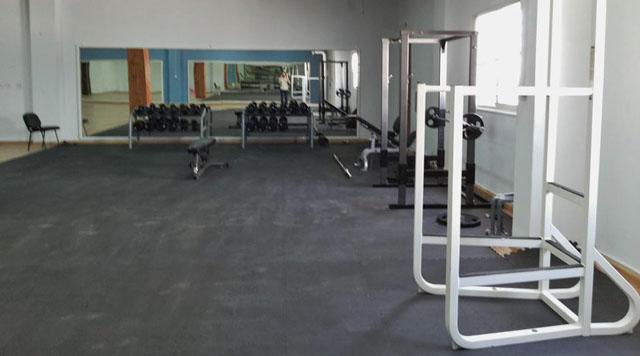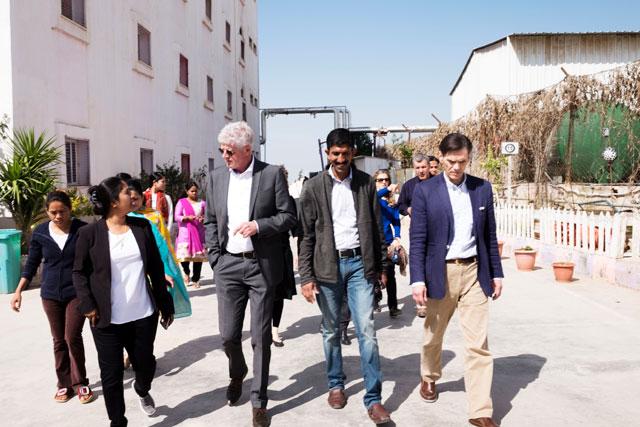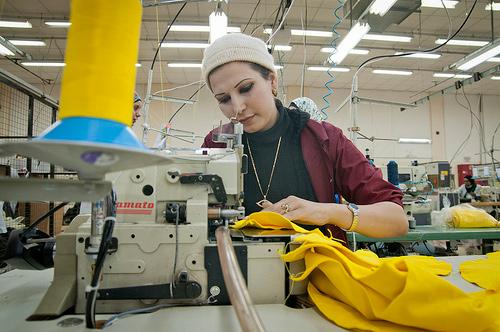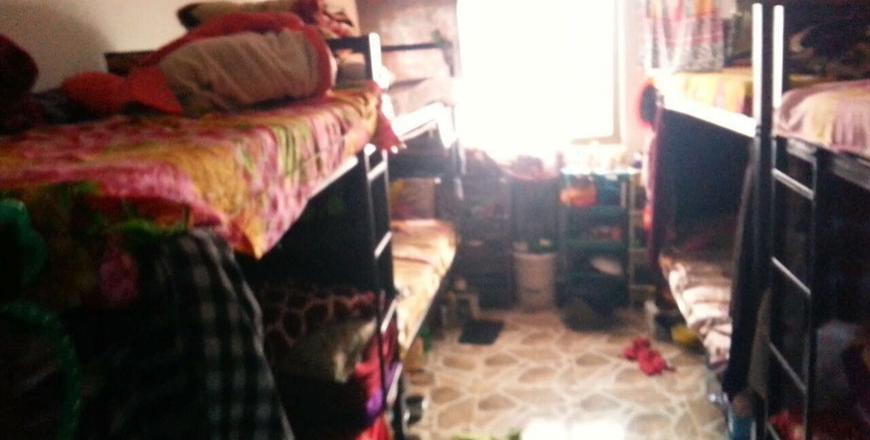You are here
Workers’ centre proves an essential lifeline for migrants
Oct 07,2014 - Last updated at Oct 07,2014

RAMTHA — Malala works 13-hour shifts six days a week in one of Jordan’s many garment factories at Al Hassan Industrial Zone, on the dusty outskirts of the city of Ramtha, some 70km north of the capital Amman.
Like many other garment workers, the 25-year-old from Madagascar makes her way to Al Hassan Industrial Zone Workers’ Centre at the end of the week.
The centre is the first of its kind in the country serving workers in Jordan’s garment sector, which accounted for $1.3 billion in exports in 2013 or 18 per cent of total exports.
“I come here every Friday to dance, to use the Internet and speak to my family back home,” says Malala.
A brand-new gym
To shake off the stress of his work as a merchandise assistant, Indika Prasanna, a 29-year-old Sri Lankan, exercises daily at the centre’s new gym.
“I hardly move at all during the day, and when I do it’s just to visit the canteen or bathroom. But since the centre opened, this has all changed,” he says.
“I used to feel tired all the time but now I feel so much better especially during the long working hours.”
Lifting weights beside him was Poraush Kumar, a 27-year-old security guard from India who says he is getting in shape for his wedding in November. “Before the gym in the centre opened, I used to exercise in my dormitory, which was too crowded and lacked the proper equipment.”
Around 16,000 of the zone’s 25,000 workers are employed in garment factories. The large majority of these — roughly 80 per cent — are migrants from the Asian subcontinent, mainly from India, Sri Lanka and Bangladesh. The zone is one of the 14 free-trade industrial parks branded as Qualifying Industrial Zones (QIZs).
Services for all
Since it opened in Al Hassan Industrial Zone late last year, the centre has quickly become an integral part of many migrant workers’ lives. It was originally conceived by Better Work Jordan, a joint initiative between the International Labour Organisation (ILO) and the International Finance Corporation to improve the living and working conditions of the tens of thousands of workers employed in Jordan’s fast growing garment industry.
Support for the centre also came from USAID, the Jordan Industrial Estates Corporation, the Irbid Chamber of Industry, the General Trade Union for Garment and Textile Industries, and the Jordan Garment, Accessories and Textiles Exporters Association. Local apparel factories and several international garment brands working in Jordan joined the project.
“These workers are a long way from home. The centre has begun to make a huge difference in their lives by giving them a place to go for recreation, to improve their skills, or to seek help,” explains Emily Hylton, the workers’ centre liaison officer.
Open five evenings a week and all day on Friday, a public holiday in Jordan, workers from a number of nationalities play cricket, practise yoga, use the Internet, admire the art displays and meet to celebrate national and religious events.
In addition to the computer room and gym, the simple, yet fully functional centre also contains a canteen, outdoor sports facilities and classrooms offering courses in women’s leadership, English and computer literacy.
Thousands of workers employed in the industrial zone also have access to legal advice and trade union support at the centre.
Sustaining decent work
A few years ago, few of the services and facilities now available at the centre could be found, or were simply not affordable for the thousands of garment workers in Al Hassan Industrial Zone. Today, plans are under way to give workers in the zone a hands-on role in managing the centre in order to provide a sense of ownership and ensure long-term sustainability.
“While Better Work Jordan helped in the establishment of the workers’ centre, its long-term success will be determined by the degree to which the centre is seen by workers as their centre,” says Phil Fishman, programme manager at Better Work Jordan. “So far, the centre has gotten off to a good start in this regard.”
Originally conceived as a pilot project, a sustainability plan to make the workers’ centre self-sufficient over the next couple of years has now been developed. Better Work Jordan hopes the facility will soon be able to sustain itself financially through worker membership fees and contributions from garment industry stakeholders, including local factories and international brands.
If successful, there are plans to replicate the centre’s model across the country.
Related Articles
IRBID — Jordanian and foreign officials on Friday celebrated the fourth anniversary of Irbid's Al Hassan Workers’ Centre, the first centre f
AMMAN — Poor ventilation, plumbing, sanitary services, failure to renew work permits and delayed payments are some of the violations that Ba
AMMAN — Authorities are investigating reported human trafficking offences committed against dozens of labourers in a garment factory in Irbi















